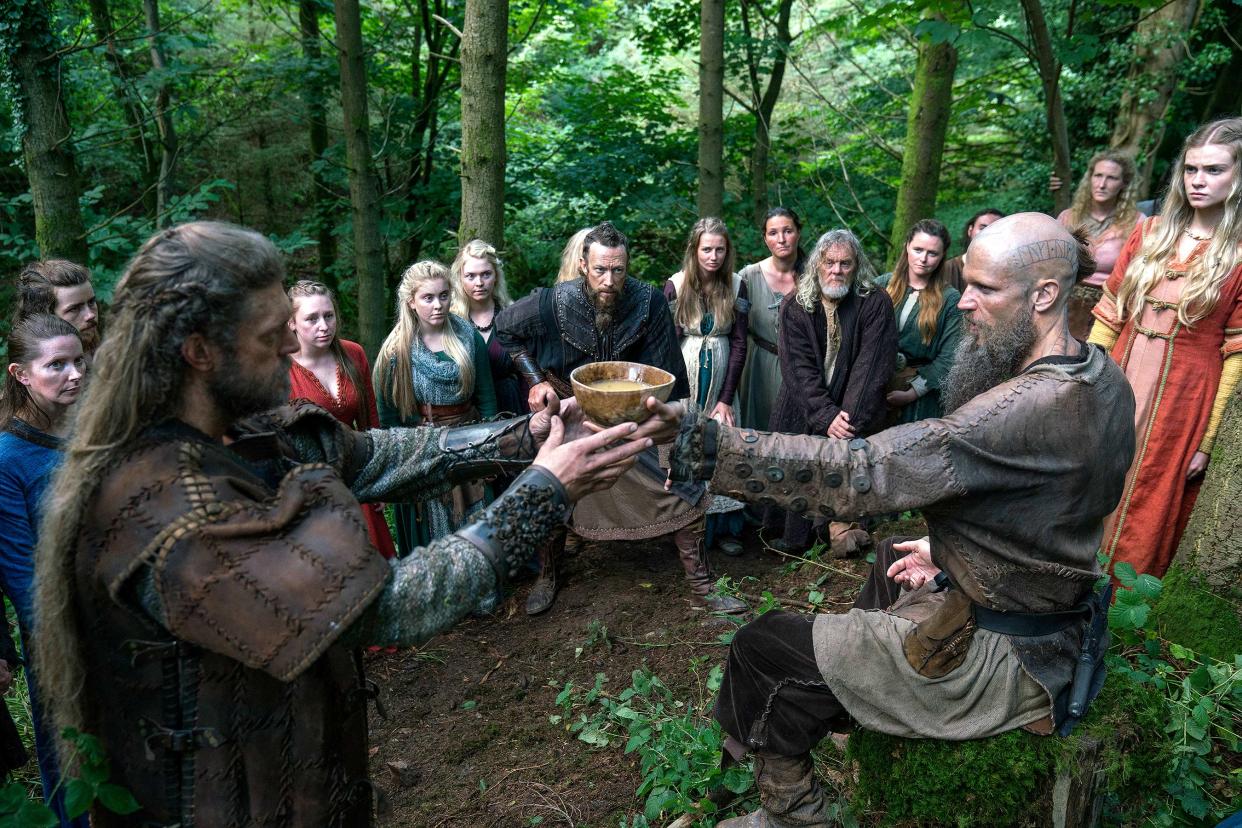Vikings recap: 'The Prisoner'

The Saxons thought they were reclaiming a piece of their home. Instead, they walked right into a deathtrap. Centuries ago, the Roman Empire built sewers under the mudstreets of York. Now, another fearsome foreign power lingers in the shadows down below. At Ivar’s command, the Northmen strike. It is a bloody massacre. Aethelwulf — not the king his father was but twice the warrior of any man — comes to life in the mayhem, screaming, “I will never die!” in his blood rage, only leaving the battle when he’s reminded that his son Alfred must live. Alfred himself faces down a vision of Vikinghood: a man swinging a great sword, like the god Thor come to Earth. Two swords stabbed into the man’s stomach only slow him down; before he dies, he takes Judith’s cousin with him.
At the Saxon camp, Queen Judith nurses the wounded, inquires after the dead. Her husband is a wreck. “I thought that God had at last seen to be merciful to us,” he says. “I was wrong, Judith. I was wrong. We must suffer. We must suffer.” Poor Aethelwulf: His whole life now is a pilgrimage toward chaos, his father’s kingdom falling into disarray.
And he has lost an ally. Bishop Heahmund, warrior for Christ, is captured in the battle. But he’s left an impression on Ivar — at one point in the massacre, Ivar pauses his army to allow Heahmund to sit upon his own horse, deciding that such a warrior belongs above the gore and grime that once were the streets of York. After the battle, Hvitserk whispers grand ambitions in Ivar’s ear. “We must look to Kattegat,” says his older brother. “We must kill Ubbe and Lagertha. And you must be crowned king of Kattegat, before Bjorn returns.” They sail homeward, seeking alliance with King Harald. Is Hvitserk sincere in his Ivar worship? Or is this a new strategy from the most mysterious of Ragnar’s sons — a way to place himself next to the crowned king of Kattegat, close enough for a dagger in the back?
Ivar has his ambitions. But he also has his curiosities. Just as his father once took an interest in a kindly monk, so Ivar makes Heahmund his own pet man-of-god. “What is evil?” he asks his prisoner, playfully but fascinated. Perhaps he is intrigued by the viciousness of Heahmund’s belief; perhaps he recognizes a kindred wild-eyed spirit. The bishop claims that he is on a journey. Ivar decides that journey lies with him, and ties his prisoner to a boat as they sail away from England.
Kattegat has already witnessed the return of one of its most famous sons. Everyone knows Floki, the boatbuilder, who raided with the great Ragnar Lothbrok and sailed with Bjorn Ironsides to the great sea southwards. Lagertha receives him as an old friend: Such memories they have shared! But Floki brings strange tidings in these strange times, telling tales of a land of the gods far from pain. “You would take warriors and shieldmaidens away from here!” angrily retorts Lagertha, knowing full well that Harald is preparing to attack.
But Floki has seen his destiny. A good climate, a rich earth: “Can you imagine how perfect life will be?” He assembles a party of true believers, promising them a colony where they can grow crops and grow their spirits. You can understand why people would follow him. Ubbe tells Floki that there is a battle brewing among Ragnar’s sons, and Floki has no interest in choosing sides — no interest in feeling the joy of victory or the grief of defeat, for he has lived long enough to know that in the end they are all the same thing. He tells his people to leave in secret, to meet him at the boatyard in nine days.
Can Floki escape the destiny of his birthplace, the eternal battle for power that has dominated Kattegat ever since Ragnar sailed west? Far away, Bjorn Ironsides has left his world behind and found a universe far more confusing than he could have ever imagined. Journeying through the desert with congenial Commander Euphemius and mysterious Kassia, Bjorn and Halfdan meet a powerful Emir, Ziyadat Allah. The Emir is a clever man and seemingly magnanimous. “Allah is great, and Muhammad is his prophet,” he says, “but there are other prophets. We recognize that.” This is his way of allowing his Viking visitors their belief system; we recognize in him an instinct similar to Ragnar and Ecbert, a willingness to grant the possibility of truth in other religions.
There is great rejoicing in the Emir’s encampment. The great man takes Kassia to bed, and sends women to Bjorn and Halfdan. Well: “She was not a she,” says Halfdan the next day. “Was that a problem for you?” asks Bjorn. Halfdan changes the subject, but doesn’t seem particularly troubled. Actually, nothing seems to trouble Halfdan too much. The next day, after a great feast, the Emir says something in his own language. Everyone laughs. “What’s that about?” the Vikings ask. Turns out that the meat they were just eating…was Commander Euphemius. Halfdan laughs a little at this, like he just heard the punchline of a particularly absurd joke.
But their time here in the desert is running out. Kassia, it seems, is some kind of power behind this particular throne: closely allied with the Emir, with ambitions of her own. It’s not long before the Vikings have a blade to their necks. Sinric looks in the distance, sees a sandstorm, suggests that they only need a couple more minutes to live. But Kassia gives the command to kill. Is this Bjorn’s destiny, to die so far from the sea that is his mother? It would be an ironic death, but most deaths are.

